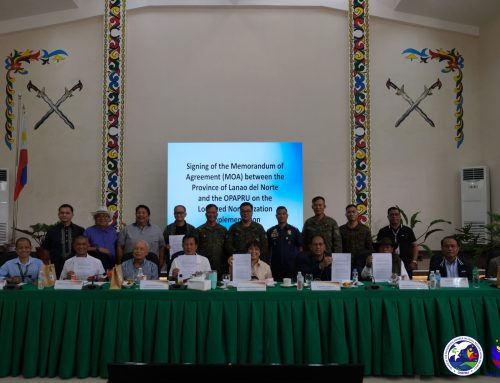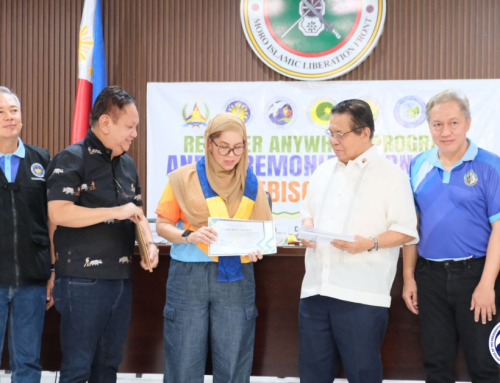PASIG CITY — Presidential Peace Adviser Secretary Carlito G. Galvez, Jr. on Friday, December 15, lauded the House of Representatives for approving four House Concurrent Resolutions (HCR) that grant amnesty to former rebels.
These include HCR Nos. 19, 20, 21 and 22, which cover members of the Rebolusyonaryong Partido ng Manggagawa ng Pilipinas/Revolutionary Proletarian Army/Alex Boncayao Brigade (RPMP-RPA-ABB), Communist Party of the Philippines-New People’s Army-National Democratic Front (CPP-NPA-NDF), Moro Islamic Liberation Front (MILF), and Moro National Liberation Front (MNLF), respectively.
“We thank on our highly-esteemed members of Congress for supporting the Marcos Administration’s Peace, Reconciliation and Unity Agenda. This will enable the national government to push forward, build on, and sustain the gains of peace throughout our nation,” Galvez said.
The said HCRs concur with Proclamations Nos. 403, 404 405 and 406 issued by President Ferdinand R. Marcos, Jr. last November 24, 2023, which provide amnesty to members of the aforementioned rebel groups.
A path to normalization
“The granting of amnesty is an integral part of the comprehensive peace process. It is a path towards normalization that would allow these former rebels not only to fully reintegrate themselves into mainstream society as peaceful, productive and law-abiding citizens, but more importantly, enable them to rebuild their lives and ensure a better future for themselves and their families,” Galvez said.
According to the peace adviser, the national government’s amnesty program is among the main confidence-building measures under the National Task Force for Ending Local Communist Armed Conflict’s (NTF-ELCAC) Local Peace Engagement (LPE) framework and the Normalization Program under the Comprehensive Agreement on Bangsamoro (CAB).
“We want to demonstrate to these former rebels that they have made the right decision in laying down their arms and returning to the folds of the law. Most of all, we want to show them that good things come to those who choose to walk the path of peace,” Galvez said.
Those who are eligible to apply for amnesty under the existing proclamations are individual members of the MNLF, MILF, RPMP/RPA/ABB AND CPP-NPA-NDF who have committed crimes defined under the Revised Penal Code or special laws of the Philippines, which are in furtherance of their political beliefs.
The amnesty proclamations cite the specific crimes that are subject of amnesty. As such, acts other than those enumerated in the said proclamations are not covered by the amnesty program.
Not “blanket amnesty”
The mere membership of an individual to an organization such as the MILF is not sufficient to qualify him or her for amnesty. The application for amnesty must specifically state the acts that were committed and are covered by the said amnesty proclamations.
Galvez explained that these amnesty proclamations do not give “blanket” amnesty to these former rebels, which would grant them amnesty regardless of the nature of their crimes.
“The granting of amnesty does not remove the grantee’s civil liability for injuries or damages caused to private persons,” he said.
“Thus, it is important for the former rebels themselves to show remorse and admit to the crimes that they have committed, and in doing so, show that they have completely turned away from a life of violence and armed struggle,” he emphasized.
Galvez noted that what amnesty does is to “extinguish any and all criminal liability for the acts subject of the amnesty grant, as well as restores all civil and political rights suspended or lost by virtue of criminal conviction.”
Key role of NAC
He said that this is what makes the job of the National Amnesty Commission (NAC) crucial in relation to the government’s peacebuilding efforts, especially in helping these fomer rebels return to mainstream society as peaceful and productive civilians.
“The NAC shall ensure the expeditious but cautious processing of amnesty application of these former rebels. This is a delicate balancing act, as the Commission will have to ensure the state’s obligation under international law to protect and promote human rights, on one hand, and the government’s commitment to peace, reconciliation and unity, on the other,” Galvez said.
He then called on members of the rebel groups to avail of the government’s amnesty program, as this will be a “life-changing decision for them.”
“This is now your opportunity to finally build a peaceful, productive and comfortable life for you and your families, which all of you rightfully deserve,” Galvez said.
Ending the decades-long armed conflict
The adoption of the HCRs by the Lower House comes in the heels of the issuance of a Joint Communique signed by the Philippine government and the CPP-NPA-NDF in Oslo, Norway, which signaled the start of fresh peace dialogues between both parties.
Under the joint statement, the government and the communist group expressed their clear intention “to end the decades-long armed conflict, armed struggle, and transform the members of the CPP-NPA-NDFP.”
“The parties agree to a principled and peaceful resolution of the armed conflict. Resolving the roots of the armed conflict and ending the armed struggle shall pave the way for the transformation of the CPP-NPA-NDFP,” the statement read. ###












